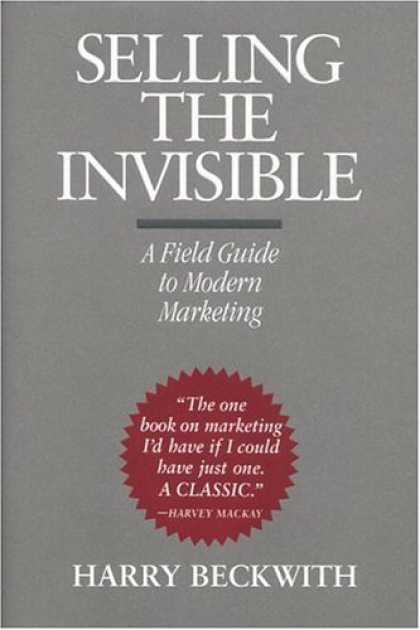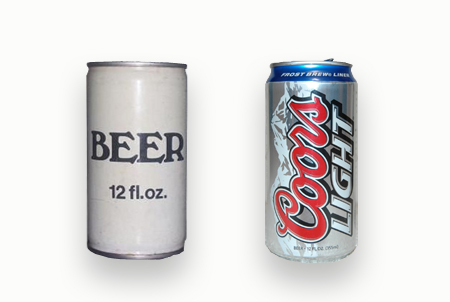I am officially the newest member of the Newfangled team, having just settled into my desk last week. I am a recent graduate of the University of North Carolina – Chapel Hill, where I also worked as the advertising manager for The Daily Tar Heel. Here at Newfangled, I will be joining the project management team as an assistant project manager.
 Training at Newfangled involves some required reading, so during my first week Chris handed me some books, one of which was Harry Beckwith’s, Selling the Invisible. I have to admit, I was fairly skeptical. The book was published in March, 1997 – over 13 years ago. At that time, I had just celebrated my 9th birthday, and the internet was even younger. How could this book possibly relate to my work as an assistant project manager for a cutting-edge web development company in 2010?
Training at Newfangled involves some required reading, so during my first week Chris handed me some books, one of which was Harry Beckwith’s, Selling the Invisible. I have to admit, I was fairly skeptical. The book was published in March, 1997 – over 13 years ago. At that time, I had just celebrated my 9th birthday, and the internet was even younger. How could this book possibly relate to my work as an assistant project manager for a cutting-edge web development company in 2010?
However, Beckwith’s points and lessons about selling a service still ring true whether you are at a company that delivers packages or designs websites. I was blown away by some of the lessons that Beckwith imparted and how he used examples to make every lesson seem like common sense.
Because of this, I decided to pick out a few of the lessons and stories that I felt were truly applicable to Newfangled and the work we do everyday—selling the invisible to our clients. In Part 1, I’ll review the first three…

1. “Bad News: You’re Competing With Disney”
This is a lesson that every service company should take to heart. Because companies like McDonalds and Disney have provided such exceptional service, they have raised everyone’s expectations of all service companies. Not only does McDonalds deliver your food quickly, but they do it while keeping their restrooms spotless and not raising their prices.
People everywhere have seen great service. They have been to Disney World and seen how clean, friendly, and creative service can be, and now they expect you to provide exceptional service as well. Disney has raised the bar, and as Beckwith wrote, “ignore your industry’s benchmarks, and copy Disney’s.”
At Newfangled, or at any service company, we have to remember the expectations that our clients have. We don’t need to dress up like Mickey Mouse, but we should be willing to go the extra mile to provide a great service – not because we want to impress our clients, but because they have come to expect it from us.

2. “The Crab Concept”
Crabs are interesting creatures. They don’t move in a straight line like most other animals. Instead they move laterally from side to side, which looks pretty crazy at first, but that is exactly how Beckwith suggests we all think. We should all think laterally and not follow the straight line of thinking that preceded us. It’s true that this will probably look dumb, but dumb can be good and sometimes we need more stupid ideas.
Beckwith says, “Be unafraid of coming up with seemingly stupid ideas, which turn out the best.” Often it is this lateral thinking that looks ridiculous at first but often turns out to be our best ideas.
At Newfangled, I have seen lateral thinking all around me. Just read some of the recent blog posts and newsletters. Using social media as a highly effective marketing tool probably looked like a ridiculous idea just a few years ago, not to mention the idea that all companies that want to build their online reputation and increase traffic on their website should start by creating a blog or newsletter. These ideas were foreign not so long ago, but thanks to this lateral thinking, Newfangled and our clients have used social media to market effectively and have created fantastic blogs and newsletters that have helped draw traffic to their site, increase their organic search traffic, and draw in more possible clients to their website. We must continue this lateral thinking in everything we do to continue to better serve our clients.

3. “Familiarity breeds business”
This is the idea that people don’t always choose what is rational. They don’t necessarially choose the better service. Instead, they almost always choose what they are most familiar with. The example that Beckwith uses is that when Steve Edleman established Edleman Telemarketing, he ran a full-page ad on the back of Telemarketing magazine every month for seven years. Three months later, Gary Cohen and Rick Diamond started ACI Telemarketing, which had superior technology and a great pitch. However, Edleman Telemarketing is now the industry giant and ACI remains much smaller.
This shows that clients aren’t always going to choose your service because you offer the best technology around. They are more likely to choose your service based upon familiarity, because familiarity breeds trust.
I have seen how the people here at Newfangled have run with this idea. Newfangled is constantly creating new content on its website by posting blogs and writing newsletters to engage and educate readers. This will increase the familiarity of the Newfangled brand and hopefully, when someone decides they need to build a website, they will come to Newfangled because it is a name they are familiar with and can trust. However, it doesn’t end there. We must continue to investigate ways to become even more familiar because people are continually consuming more and more media. That is why we use social media, and recommend that all of our clients look into social media as a tool to become more familiar with their potential clients.
To be continued in Part 2…

